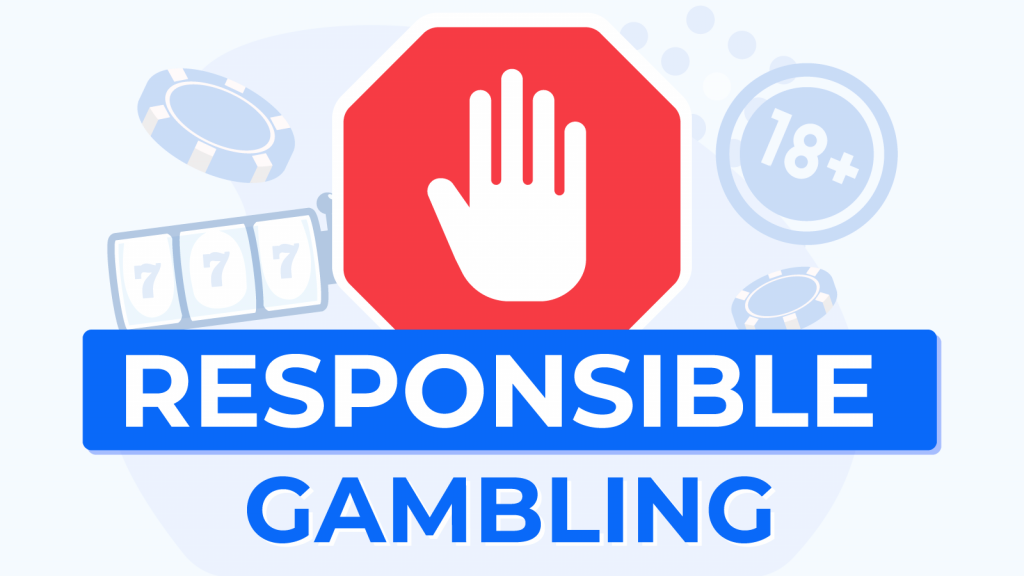Guiding Principles Of Responsible Gambling

At the heart of online sports betting is the ethos of Responsible Gambling. Embracing this notion goes beyond merely recognizing it; it’s about embedding it in one’s betting routine. We’ve detailed the concept to help users grasp its significance and benefit from the safeguards it provides.

What is Responsible Gambling?
Responsible gambling promotes safe and controlled gambling behavior to prevent addiction and minimize harm. It emphasizes informed decisions, protecting vulnerable populations, and ensuring access to help services. Operators are encouraged to provide environments that discourage excessive gambling, offer self-exclusion programs, and monitor player behaviors. Responsible gambling ensures that the activity remains a choice, not a compulsion, prioritizing players’ well-being over profit.

Risk Factors Affecting Gambling Addiction
1
Neurochemical Dynamics
Dopamine, a neurotransmitter associated with pleasure and reward mechanisms in the brain, plays a pivotal role in gambling activities. When an individual gambles, dopamine levels surge, leading to feelings of pleasure. Over time, with continuous exposure, the brain seeks repeated dopamine rushes, fostering dependency.
2
Psychological Gratification
The thrill of winning, even if sporadic, can induce intense euphoria. This ‘high’ can become something that individuals chase, leading them back to gamble repeatedly.
3
Social Factors
Peer pressure, the glamorization of gambling in media, and cultural acceptance can encourage individuals to start and continue gambling. Moreover, social settings where gambling is the primary activity can be enticing, providing a sense of belonging.
4
Escape Mechanism
For some, gambling offers an escape from life’s problems, stresses, or even from feelings of inadequacy or depression. The act of gambling provides a temporary reprieve from such feelings, making it an attractive option.
5
Family History
Living in areas where gambling venues are easily accessible or the presence of online gambling platforms can contribute to higher rates of gambling addiction.
6
Accessibility And Availability
Living in areas where gambling venues are easily accessible or the presence of online gambling platforms can contribute to higher rates of gambling addiction.
7
Financial Desperation
Individuals facing financial hardships might resort to gambling in the hopes of a quick fix, leading them down the path of addiction.
8
Biological Predispositions
There may be genetic factors or brain structures that make some individuals more susceptible to developing gambling addictions than others.

Recognizing Gambling Addiction
Gambling, when done in moderation, can be a fun pastime. However, it can escalate into an addiction for some individuals, affecting every facet of their lives. Recognizing the signs of gambling addiction is paramount for intervening early and seeking help.

Addressing The Challenge Of Underage Gambling
Online gambling has indeed become a favored activity among many adults. However, engaging in such pastimes is prohibited for those below 18 or 21, contingent on the jurisdiction. Most nations globally have established this age threshold to protect younger individuals. The allure of casino games holds the potential to trigger addictive behaviors in both adolescents and grown-ups, making it especially concerning for younger populations.
Recent trends show a worrying increase in underage betting. As an illustration, a study revealed that approximately 450,000 minors engage in regular betting activities in the UK alone. Many of these young enthusiasts are on the precipice of developing, if not already grappling with, a gambling addiction, which can have profound adverse consequences.
To shield children from the potential pitfalls of online gambling, consider the following preventative measures:

Open Dialogue:
Discuss the inherent dangers of gambling and its potential consequences with them.

Leverage Technology:
Make use of parental control tools to restrict access to betting platforms.

Secure Access:
Ensure all gambling platforms and apps are password-protected.

Lead by Example:
Refrain from gambling when children are present, as actions often speak louder than words.

Financial Literacy:
Educate them about the value of money and explain why betting isn’t a viable or responsible means to wealth.

Vigilant Oversight:
Regularly check their online activities to ensure they aren’t accessing unsuitable content.

Strategies To Prevent Compulsive Gambling
Preventing compulsive gambling requires a multi-faceted approach that combines personal strategies, societal efforts, and structural measures from gambling operators. Here are several strategies to consider:
By actively integrating these strategies, individuals can build a robust defense against the lure of compulsive gambling.
If you or someone you know is grappling with problem gambling, taking prompt action is essential. Start by recognizing the issue and acknowledging its impact. Reach out to helplines such as the National Council on Problem Gambling in the US or GamCare in the UK. Professional counselors specializing in addiction can provide invaluable guidance. Consider joining support groups like Gamblers Anonymous, which offer peer-based assistance and coping strategies.
Additionally, employ self-help tools, including self-exclusion from gambling platforms. It’s also wise to consult with financial counselors if monetary issues have arisen. Remember, seeking help is a sign of strength, and numerous resources are available to assist in regaining control.

Why Opt for Responsible Gambling Platforms?
Opting for responsible gambling platforms is crucial for maintaining the integrity of the gaming experience and ensuring player well-being. These platforms embed features and tools that allow players to set limits on their gambling, take breaks, and access resources if they feel their habits are becoming problematic. Such proactive measures ensure that players can enjoy the thrill of the game while staying within their personal limits, preventing the descent into addictive behaviors. This not only preserves the mental and financial health of individuals but also creates a sustainable and ethical gaming environment where players are treated with respect and care.

Organizations That Help Problem Gamblers Around The World
Certainly, gambling addiction is a serious issue that affects individuals and their families worldwide. Several organizations offer support and resources to those who struggle with problem gambling. Here are some organizations that help problem gamblers around the world:
- GambleAware – UK
- GamCare – UK
- Gordon Moody Association – UK
- National Problem Gambling Clinic – UK
- Gamblers Anonymous – UK
- Gambling Therapy – UK
- Adictel – France
- Jugar Bien – Spain
- Gamblers Anonymous – Ireland
- Spelberoende – Sweden
- Gambling Therapy – Europe
- European Association for the Study of Gambling – Europe
- Spielsuchthilfe – Austria
- Gok Hulp – Belgium
- Anonymní Gambleři Česko – Czech Republic
- HUPIS – Croatia
- Spillemyndigheden – Denmark
- Peluuri – Finland
- Hasartmängusõltuvuse Nõustamiskeskus – Estonia
- Glücksspielsucht Problem Gambling – Germany
- Gioca Responsabile – Italy
- Responsible Gaming Foundation – Malta
- AGOG – Netherlands
- SICAD – Portugal
- National Council on Problem Gambling – Singapore
- Hope Trust – India
- In Touch – Philippines
- National Problem Gambling Helpline – USA
- APGSA – USA
- Gamblers Anonymous – USA
- Help Guide – USA
- Canada Safety Council – Canada
- Know the Signs – Canada
- ProblemGambling – Canada
- Saskatchewan Problem Gambling Helpline – Canada
- Punto de Partida – Mexico
- Jogo Responsável – Brazil
- Jogadores Anônimos – Brazil
- Saber Jugar – Argentina
- Autoridad de la Fiscalizacion del Juego (AJ) – Bolivia
- Antigua Gaming – Antigua and Barbuda
- Jugadores Anónimos Colombia – Colombia
- Juego Responsable – Chile
- Psicólogos Ludopatía – Chile
- Juego responsible – Puerto Rico
- Adicción al juego Tratamiento – Peru
- Programa de Juegos Responsable – Uruguay
- Gambling Helpline – New Zealand
- Problem Gambling Foundation – New Zealand
- The Salvation Army: Oasis Centre – Australia
- Relationships – Australia
- Gamblers Anonymous – Australia
- Gambling Help Online – Australia
- Victorian Responsible Gambling Foundation – Australia

Final Thoughts From Our Experts
Being a conscientious bettor is a collaborative effort. It involves personal vigilance, but also the support from platforms championing responsible gambling. This holistic approach ensures a safer betting landscape for everyone. We aim to empower our community with the tools and knowledge to bet wisely and safely.







